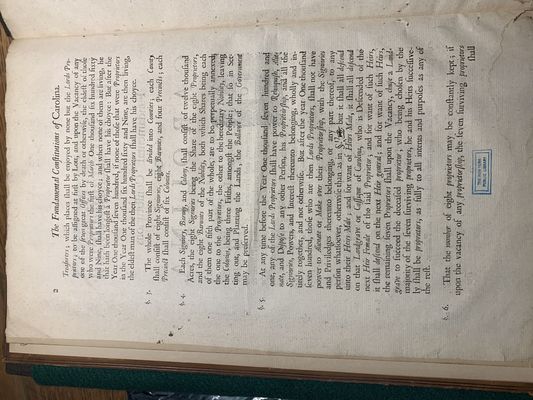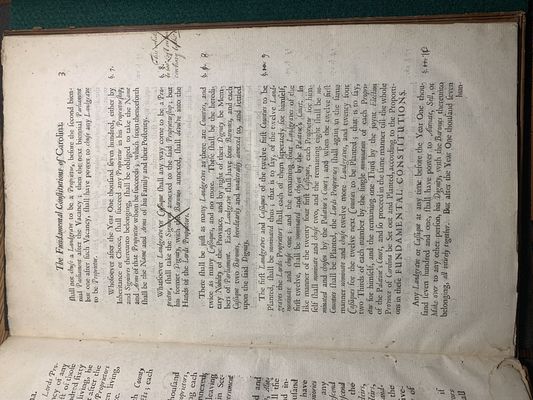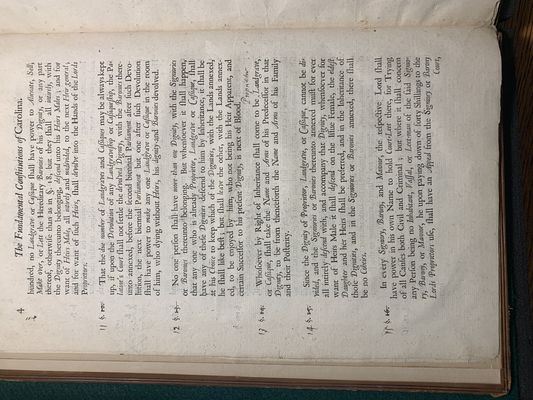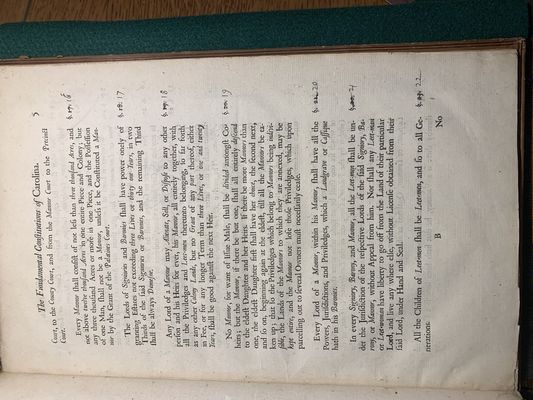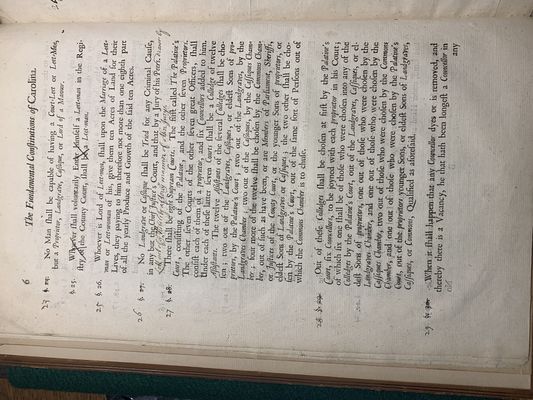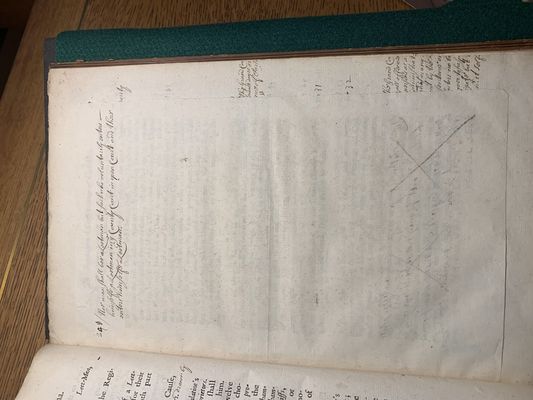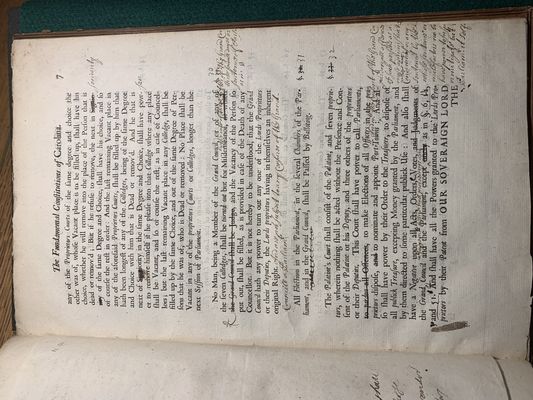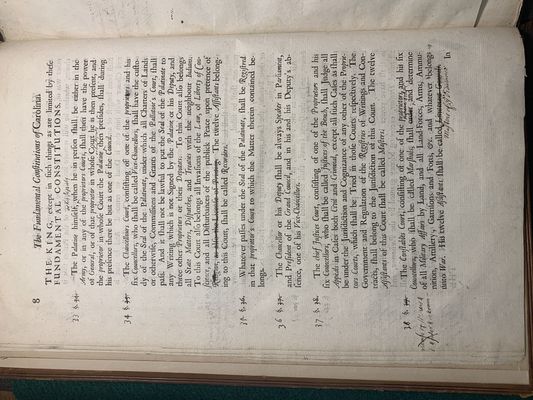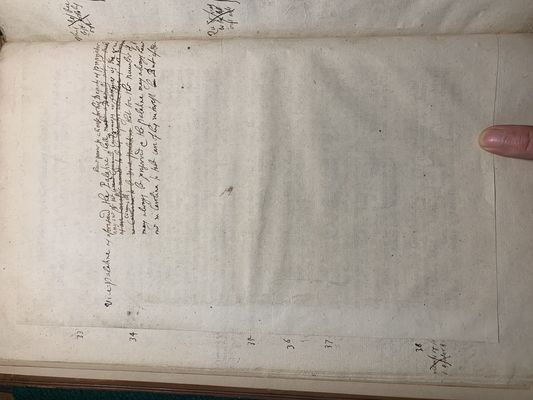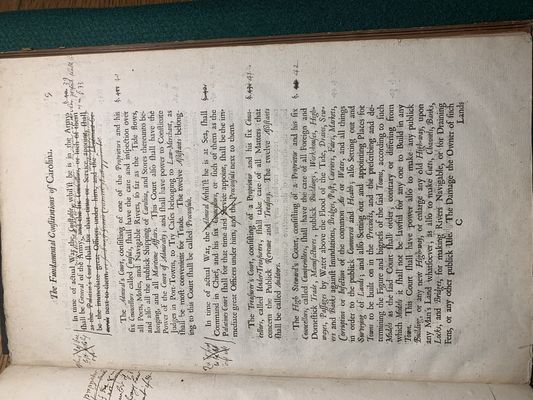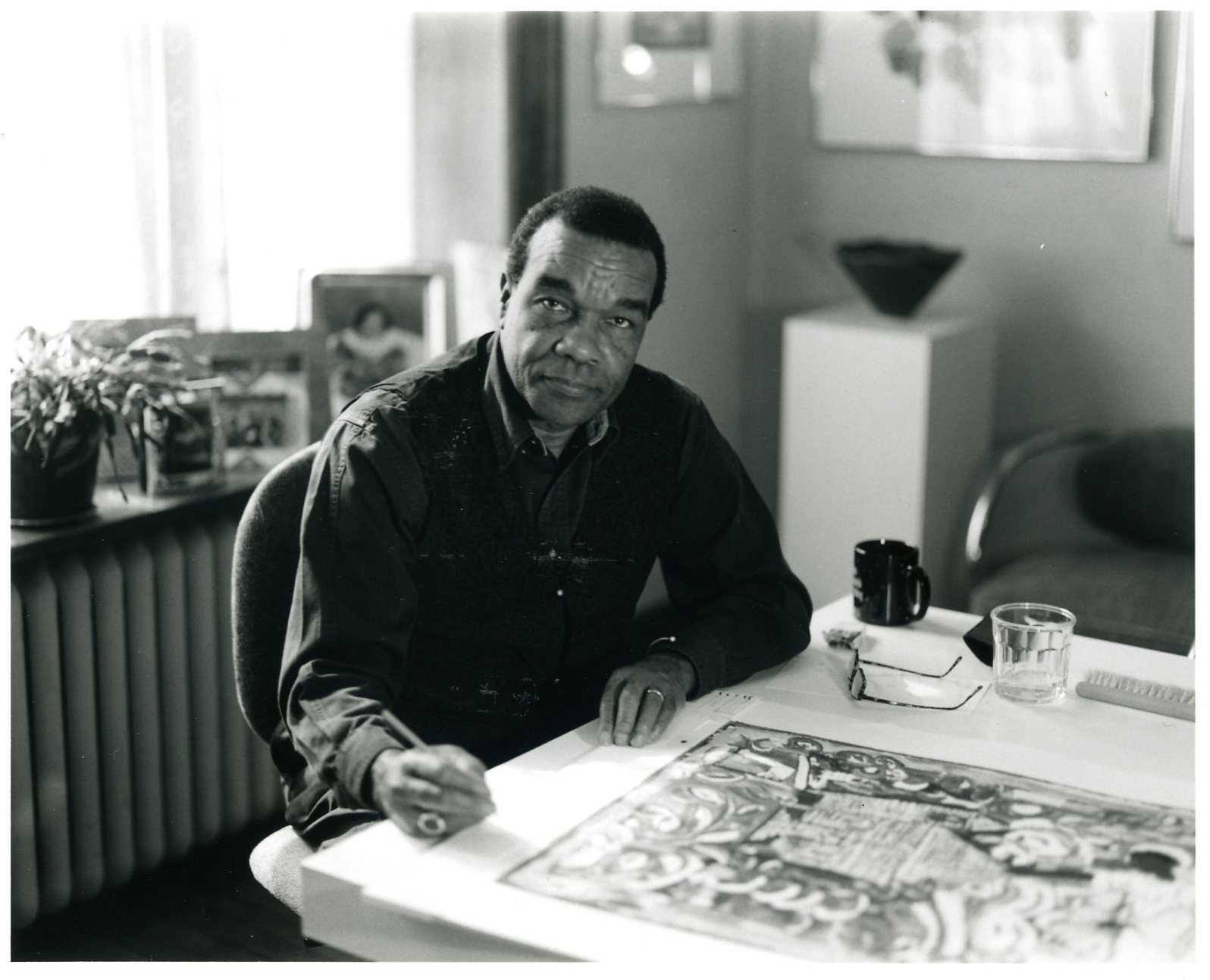Pages That Need Review
Fundamental Constitutions of Carolina (1681)
2
The Fundamental Constitutions of Carolina.
Treasurers; which places shall be enjoyed by none but the Lords Proprietors; to be assigned at first by Lott, and upon the Vacancy of any one of the seven great Offices by death or otherwise, the eldest of those who were Proprietors the first of March One thousand six hundred sixty and Nine, shall have his choyce; and when none of them are living, he that hath been longest a Proprietor shall have his choyce: But after the Year One thousand seven hundred, if none of those that were Proprietors in the Year One thousand six hundred sixty and Nine, are then living, the eldest man of the then Lords Proprietors shall have his choyce.
§. 3. The whole Province shall be divided into Counties; each County shall consist of eight Signiories, eight Baronies, and four Precincts; each Precinct shall consist of six Colonies.
§. 4. Each Signiory, Barony, and Colony, shall consist of twelve thousand Acres, the eight Signiories being the Share of the eight Proprietors, and the eight Baronies of the Nobility, both which Shares being each of them one fifth part of the whole, are to be perpetually annexed, the one to the Proprietors, the other to the hereditary Nobility, leaving the Colonies, being three Fifths, amongst the People; that so in Set ting out, and Planting the Lands, the Ballance of the Government may be preserved.
§. 5. At any time before the Year One thousand seven hundred and one, any of the Lords Proprietors shall have powr to Relinquish, Alienate, and Dispose to any other Person, his Proprietorship, and all the Signiories, Powers, and Interest thereunto belonging, wholly and intirely together, and not otherwise. But after the year One thousand seven hundred, those who are then Lords Proprietors, shall not have power to Alienate or Make over their Proprietorship, with the Signiories and Priviledges thereunto belonging, or any part thereof, to any person whatsoever, otherwise than as in §.17 18. but it shall all descend unto their Heirs Male; and for want of Heirs Male, it shall all descend on that Landgrave or Cassique of Carolina, who is Descended of the next Heir Female of the said Proprietor. and for want of such Heirs, it shall descend on the next Heir general; and for want of such Heirs, the remaining seven Proprietors shall upon the Vacancy, chuse a Landgrave to succeed the deceased proprietor, who being chosen by the majority of the seven surviving proprietors, he and his Heirs successively shall be proprietors, as fully to all intents and purposes as any of the rest.
§.6. That number of eight proprietors may be constantly kept; if upon the vacancy of any proprietorship, the seven surviving proprietors
3
The Fundamental Constitutions of Carolina.
shall not chuse a Landgrave to be a Proprietor, before the second biennial Parliament after the Vacancy; then the next biennial Parliament but one after such Vacancy, shall have power to chuse any Landgrave to be Proprietor.
§. 7. Whosoever after the Year One thousand seven hundred, either by Inheritance or Choice, shall succeed any Proprietor in his Proprietorship, and Signiores thereunto belonging, shall be obliged to take the Name and Arms of that Proprietor whom he succeeds; which from thenceforth shall be the Name and Arms of his Family and their Posterity.
§. 8. {This whole to bee left out as contrary to the [?]} Whatsoever Landgrave or Cassique shall any way come to be a Proprietor, shall take the Signiories annexed to the said Proprietorship; but his former Dignity, with the Baronies annexed, shall devolve into the Hands of the Lords Proprietors.
§.9. 8. There shall be just as many Landgraves as there are Counties, and twice as many Cassiques, and no more. These shall be the hereditary Nobility of the Province, and by right of their Dignity be Members of Parliament. Each Landgrave shall have four Baronies, and each Cassique two Baronies, hereditarily and unalterably annexed to, and settled upon the said Dignity.
§.10. 9 The first Landgraves and Cassiques of the twelve first Counties to be Planted, shall be nominated thus; that is to say, of the twelve Landgraves the Lords Proprietors shall each of them seperately for himself, nominate and chuse one; and the remaining four Landgraves of the first twelve, shall be nominated and chosen by the Palatine's Court. In like manner of the twenty four first Cassiques, each Proprietor for himself shall nominate and chuse two, and the remaining eight shall be nominated and chosen by the Palatine's Court; and when the twelve first Counties shall be Planted, the Lords Proprietors shall again in the same manner nominate and chuse twelve more Landgraves, and twenty four Cassiques for the twelve next Counties to be Planted; that is to say, two Thirds of each number by the single nomination of each Proprietor for himself, and the remaining one Third by the joynt Election of the Palatine's Court, and so proceed in the same manner till the whole Province of Carolina be Set out and Planted, according to the Proportions in these FUNDAMENTAL CONSTITUTIONS.
§.11. 10 Any Landgrave or Cassique at any time before the Year One thousand seven hundred and one, shall have power to Alienate, Sell, or Make over to any other person, his Dignity, with the Baronies thereunto belonging, all intirely together. But after the Year One thousand seven
4
The Fundamental Constitutions of Carolina.
hundred, no Landgrave or Cassique shall have power to Alienate, Sell, Make over, or Lett the Hereditary Baronies of his Dignity, or any part thereof, otherwise than as in §. 18, but they shall all intirely, with the Dignity thereunto belonging, descend unto his Heirs Males; and for want of Heirs Male, all intirely and undivided, to the next Heir general; and for want of such Heirs, shall devolve into the Hands of the Lords Proprietors.
11 §.12. That the due number of Landgraves and Cassiques may be always kept up, if upon the Devolution of any Landgraveship or Cassiqueship, the Palatine's Court shall not settle the devolved Dignity, with the Baronies thereunto annexed, before the second biennial Parliament after such Devolution, the next biennial Parliament but one after such Devolution shall have power to make any one Landgrave or Cassique in the room of him, who dying without Heirs, his dignity and Baronies devolved.
12 §.13. No one person shall have more than one Dignity, with the Signiories or Baronies thereunto belonging. But whensoever it shall happen, that any one who is already Proprietor, Landgrave or Cassique, shall have any of these Dignities descend to him by Inheritance, it shall be at his Choice to keep which of the Dignities, with the Lands annexed, he shall like best; but shall leave the other, with the Lands annexed, to be enjoyed by him, who not being his Heir Apparent, and certain Successor to his present Dignity, is next of Blood.
13 §.14. Whosoever by Right of Inheritance shall come to be Proprietor Landgrave, or Cassique, shall take the Name and Arms of his Predecessor in that Dignity, to be from thenceforth the Name and Arms of his Family and their Posterity.
14 §.15. Since the Dignity of Proprietor, Landgrave, or Cassique, cannot be divided, and the Signiories or Baronies thereunto annexed must for ever all intirely descend with, and accompany that Dignity, whensoever for want of Heirs Male it shall descend on the Issue Female, the eldest Daughter and her Heirs shall be preferred, and in the Inheritance of those Dignities, and in the Signiories or Baronies annexed, there shall be no Coheirs.
15 §.16. In every Signiory, Barony, and Mannor, the respective Lord shall have power in his own Name to hold Court-Leet there, for Trying of all Causes both Civil and Criminal; but where it shall concern any Person being no Inhabitant, Vassal, or Leet-man of the said Signiory, Barony, or Mannor, he upon paying down of forty Shillings to the Lords Proprietors use, shall have an Appeal from the Signiory or Barony
5
The Fundamental Constitutions of Carolina.
Court, to the County Court, and from the Mannor Court to the Precinct Court.
§.17. 16 Every Mannor shall consist of not less than three thousand Acres, and not above twelve thousand Acres in one entire Piece and Colony; but any three thousand Acres or more in one Piece, and the Possession of one Man, shall not be a Mannor, unless it be Constituted a Mannor by the Grant of the Palatines Court.
§.18. 17 The Lords of Signiories and Baronies shall have power onely of granting Estates not exceeding three Lives or thirty one Years, in two Thirds of the said Signiories or Baronies, and the remaining Third shall be always Demesne.
§.19. 18 Any Lord of a Mannor may Alienate, Sell, or Dispose to any other person and his Heirs for ever, his Mannor, all entirely together, with all the Priviledges and Leet-men thereunto belonging, so far forth as any other Colony Lands, but no Grant of any part thereof, either in Fee, or for any longer Term than three Lives, or one and twenty Years, shall be good against the next Heir.
§.20. 19 No Mannor, for want of Issue Male, shall be divided amongst Coheirs; but the Mannor, if there be but one, shall all entirely descend to the eldest Daughter and her Heirs. If there be more Mannors than one, the eldest Daughter first shall have her choice, the second next, and so on, beginning again at the eldest, till all the Mannors be taken up; that so the Priviledges which belong to Mannors being indivisible, the Lands of the Mannors to which they are annexed, may be kept entire, and the Mannor not lose those Priviledges, which upon parcelling out to several Owners must necessarily cease.
§.21. 20 Every Lord of a Mannor, within his Mannor, shall have all the Powers, Jurisdictions, and Priviledges, which a Landgrave or Cassique hath in his Baronies.
§.22. 21 In every Signiory, Barony, and Mannor, all the Leet-men shall be under the Jurisdiction of the respective Lords of the said Signiory, Barony, or Mannor, without Appeal from him. Nor shall any Leet-man or Leet-woman have liberty to go off from the Land of their particular Lord, and live any where else, without License obtained from their said Lord, under Hand and Seal.
§.23. 22 All the Children of Leet-men shall be Leet-men, and so to all Generations.
6
The Fundamental Constitutions of Carolina.
23 §.24. No Man shall be capable of having a Court-Leet or Leet-Men, but a Proprietor, Landgrave, Cassique, or Lord of a Mannor.
§. 25. Whoever shall voluntarily Enter himself a Leet-man in the Registry of the County Court, shall be a Leet-man.
25 §. 26. Whoever is Lord of Leet-men, shall upon the Marriage of a Leetman or Leet-woman of his, give them ten Acres of Land for their Lives, they paying to him therefore not more than one eighth part of all the yearly Produce and Growth of the said ten Acres.
26 §.27. No Landgrave or Cassique shall be Tried for any Criminal Cause, in any but the Chief Justice's Court, and that by a Jury of his Peers. drawn by Lott out of ye Nobility after ye manner of other Jurys.
27 §.28. There shall be eight Supream Courts. The first called The Palatine's Court, consisting of the Palatine, and the other seven Proprietors. The other seven Courts of the other seven great Officers, shall consist each of them of a proprietor, and six Councellors added to him. Under each of these latter seven Courts shall be a Colledge of twelve Assistants. The twelve Assistants of the several Colledges shall be chosen; two out of the Landgraves, Cassiques, or eldest Sons of proprietors; by the Palatine's Court; two out of the Landgraves, by the Landgraves Chamber; two out of the Cassiques, by the Cassiques Chamber; four more of the twelve shall be chosen by the Commons Chamber, out of such as have been, or are Members of Parliament, Sheriffs, or Justices of the County Court, or the younger Sons of proprietors, or eldest Sons of Landgraves or Cassiques; te two other shall be chosen by the Palatine's Court, out of the same sort of Persons out of which the Commons Chamber is to chuse.
28 §.29. Out of these Colledges shall be chosen at first by the Palatine's Court, six Councellors, to be joyned with each proprietor in his Court; of which six one shall be one of those who were chosen into any of the Colledges by the Palatine's Court, out of the Landgraves, Cassiques, or eldest Sons of proprietors, one out of those who were chosen by the Landgraves Chamber, and one out of those who were chosen by the Cassiques Chamber, two out of those who were chosen by the Commons Chamber, and one out of the those who were chosen by the Palatine's Court, out of the proprietors younger Sons, or eldest Sons of Landgraves, Cassiques, or Commons, Qualified as aforesaid.
29 §.30. When it shall happen that any Councellor dyes or is removed, and thereby there is a Vacancy, he that hath been longest a Councellor in
6a
24 § / Noe man shall bee a Leetman but such who voluntarily enters himselfe a Leetman in ye County Court in open Court and there enters himselfe a Leetman.
7
The Fundamental Constitutions of Carolina.
any of the Proprietors Courts of the same degree and choice the other was of, whose Vacant place is to be filled up, shall have his choice, whether he will remove into the place of the Person that is dead or remov'd; But if he refuse to remove, the next in Signio- Seniority rity of the same Degree and Choice, shall have his choice, and so of course the rest in order: And the last remaining Vacant place in any of the aforesaid Proprietors Courts, shall be filled up by him that hath been longest of any of the Colledges, being of the same Degree and Choice with him that is Dead or remov'd. And he that is next of Signiority in the same Degree and Choice, shall have pow- {Sen.} er to remove himself if he please into that Colledge where any place shall be Vacant, and so of course the rest, as in case of Councellors; but the last remaining Vacant place in any Colledge, shall be filled up by the same Choice, and out of the same Degree of Persons that he was of, who is Dead or removed: No Place shall be Vacant in any of the proprietors Courts or Colledges, longer than the next Session of Parliament.
§.31. 30 No Man, being a member of the Grand Council, or of any of the seven Colledges, shall be turned out but for Misdemeanour, by the rate of three fifths of the Grand Court three severall dayes or sentence of Parli. as in § of which the Grand Council shall be Judge, and the Vacancy of the Person so put out, shall be filled, as provided in case of the Death of any Councellor. But it is not hereby to be understood, that the Grand Council hath any power to turn out any one of the Lords Proprietors or their Deputies, the Lords proprietors having in themselves an inherent original Right. {And are not Subject to any Censures of the Grand Councill or Parliament.}
§.32. 31 All Elections in the Parliament, in the several Chambers of the Parliament, and in the Grand Council, shall be Passed by Balloting. [?]
§. 33. 32 The Palatine's Court shall consist of the Palatine, and seven proprietors, wherein nothing shall be acted without the Presence and Consent of the Palatine or his Deputy, and three others of the proprietors or their Deputies. This Court shall have power to call Parliaments, to pardon all Offences, to make Elections of all Officers in the proprietors dispose, and to nominate and appoint Port-Towns: And with the Consent of the Grand [Cou?] pardon all offences of such persons as a mase [administrat? ] publique charge , Condemned or any Sentenc'd by the [P?] whose sentence or malefactors no [bo?] have power to [Susp?] or mitigate but in Parliament it selfe And also shall have power by their Order to the Treasurer, to dispose of all publick Treasure, excepting Money granted by the Parliament, and by them directed to some partitcular publick Use: And also shall have a Negative upon all Acts, Orders, & Votes, and Judgments of the Grand Council and the Parliament, except in Judgements & Juditiall proceedings and onely as in §.6, 12 11, 30 and 51. 81 And shall have all the Powers granted to the Lords Proprietors by their Patent from OUR SOVERAIGN LORD
8
The Fundamental Constitutions of Carolina.
THE KING, except in such things as are limited by these FUNDAMENTAL CONSTITUTIONS.
33 §.34. The Palatine himself, or his deputy when he in person shall be either in the Army, or in any of the proprietors Courts, shall then have the power of General, or of that proprietor in whose Court he is then present, and the proprietor in whose Court the Palatine or his deputy then presides, shall during his presence there be but as one of the Council.
34 §. 35. The Chancellors Court, consisting of one of the proprietors and his six Councellors, who shall be called Vice-Chancellors, shall have the custody of the Seal of the Palatinate, under which all Charters of Lands or otherwise, Commissions and Grants of the Pallatine's Court, shall pass. And it shall not be lawful to put the Seal of the Palatinate to any Writing which is not Signed by the Palatine or his Deputy, and three other Proprietors or their Deputies. To this Court also belongs all State Matters, Dispatches, and Treaties with the neighbour Indians. To this Court also belongs all Invasions of the Law, of Liberty of Conscience, and all Disturbances of the publick Peace upon pretence of Religion, as also the License of Printing. The twelve Assistants belonging to this Court, shall be called Recorders.
35 §.36. Whatever passes under the Seal of the Palatinate, shall be Registred in that proprietor's Court to which the Matter therein contained belongs.
36 §.37. The Chancellor or his Deputy shall be always Speaker in Parliament, and President of the Grand Council, and in his and his Deputy's absence, one of his Vice-Chancellors.
37 §.38. The chief Justices Court, consisting of one of the Proprietors and his six Councellors, who shall be called Justices of the Bench, shall Judge all Appeals in Cases both Civil and Criminal, except all such Cases as shall be under the Jurisdiction and Cognizance of any other of the Proprietors Courts, which shall be Tried in those Courts respectively. The Government and Regulation of the Registries of Writings and Contracts, shall belong to the Jurisdiction of this Court. The twelve Assistants of this Court shall be called Masters.
38 §.39. The Constables Court, consisting of one of the proprietors, and his six Councellors, who shall be called Marshals, shall order heere order and determine of all Military Affairs by Land, and all Land-Forces, Arms, Ammunition, Artillery, Garrisons and Forts, &c. and whatever belongs unto War. His twelve Assistants shall be called Masters of ye Ordinance Lieutenant-Generals
{[possibly Locke's handwriting, some part apparently cut off when the book was trimmed] [?] of [soldiers? ] & [?] & order & determm- }
8b
[This marginalia is likely in John Locke's handwriting] Vice-Palatine as aforesaid, the Palatine shall have power to choose for his Deputy as proprietormake a Deputy out of such any one of the Grand Councill Landgraves or Cassiques of the grand as are hereafter named to be his deputy. when there is noe proprie- Councill; in Carolina to be vice palatine that soe the number of 8 may always be preserved & the Palatine may always have one in Carolina to take care of his interest. bu But if &c.
9
The Fundamental Constitutions of Carolina.
{[Likely in Locke's handwriting] This to be left wholy out}§.40. 39 In time of actual War, the Constable whil'st he is in the Army, shall be General of the Army, [Locke's handwriting] except the Pallatine be there in person or his deputy who the when present shall be as in §33 and the six Councellors, or such of them as the Palatine's Court shall for that time or Service appoint, shall be the immediate great Officers underim, and the Masters of ye Ordiannce Lieutenant-Ge- nerals next to them. or such as ye Grand Councill shall appointe.
§.41. 40 The Admiral's Court, consisting of one of the Proprietors and his six Councellors called Consuls, shall have the care and inspection over all Ports, Moles, and Navigable Rivers, so far as the Tide flows, and also all the publick Shipping of Carolina, and Stores thereunto belonging, and all Maritime Affairs. This Court also shall have the Power of the Court of Admiralty; and shall power to Constitute Judges in Port-Towns, to Try Cases belonging to Law-Merchant, as shall be most convenient for Trade. The twelve Assistants belonging to this Court shall be called Proconsuls.
{[Locke's handwriting] Qu it has to be left out also}§. 42. In time of actual war, the Admiral whil'st he is at Sea, shall Command in Chief, and his six Councellors, or such of them as the Palatines Court shall for that time and Service appoint, shall be the immediate great Officers under him, and the Proconsuls next to them.
§.43. 41 The Treasurer's Court, consisting of a Proprietor and his six Councellors, called Under-Treasurers, shall take care of all Matters that concern the Publick Revenue and Treasury. The twelve Assistants shall be called Auditors.
§.44. 42 The High Steward's Court, consisting of a Proprietor and his six Councellors, called Comptrollers, shall have the care of all Foreign and Domestick Trade, Manufactures, publick Buildings, Workshouses, Highwayes, Passages by Water above the Flood of the Tide, Drains, Sewers and Banks against Inundations, Bridges, Post, Carriers, Fairs, Markets, Corruption or Infection of the common Air or Water, and all things in order to the publick Commerce and Health; also Setting out and Surveying of Lands; and also Setting out and appointing Places for Towns to be built on in the Precincts, and the prescribing and determining the Figure and bigness of the said Towns, according to such Models as the said Court shall order, contrary or differing from which Models it shall not be lawful for any one to Build in any Town. This Court shall have power also to make any publick Building, or any new High-way, or enlarge any old High-way, upon any Man's Land whatsoever, as also to make Cutts, Channels, Banks, Locks, and Bridges, for making Rivers Navigable, or for Draining Fens, or any other publick Use. The Damage the Owner of such
